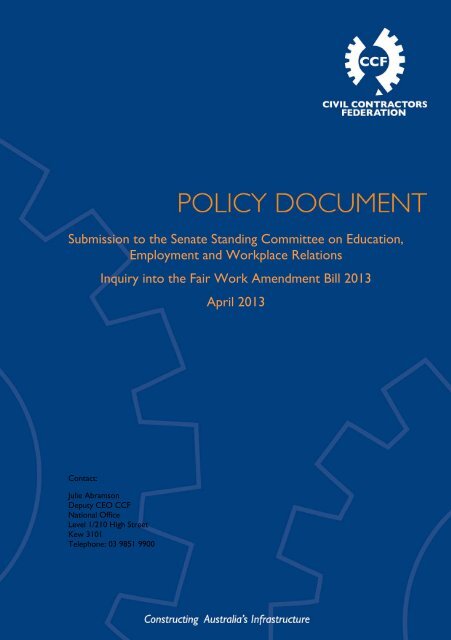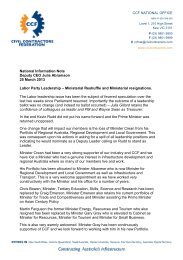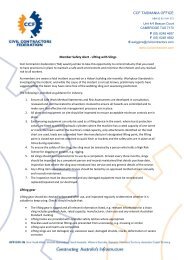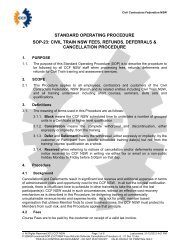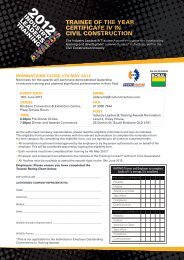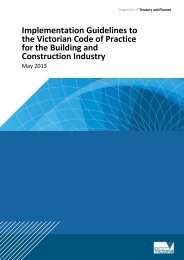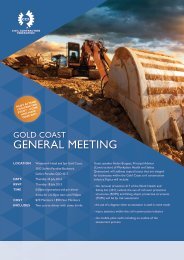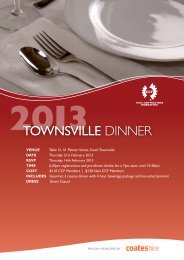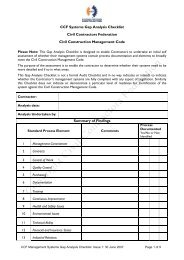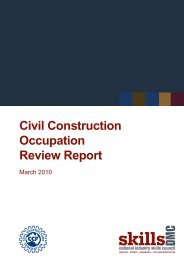Submission to FWA Inquiry - April 2013 - Civil Contractors Federation
Submission to FWA Inquiry - April 2013 - Civil Contractors Federation
Submission to FWA Inquiry - April 2013 - Civil Contractors Federation
Create successful ePaper yourself
Turn your PDF publications into a flip-book with our unique Google optimized e-Paper software.
<strong>Submission</strong> <strong>to</strong> the Senate Standing Committee on Education,<br />
Employment and Workplace Relations<br />
<strong>Inquiry</strong> in<strong>to</strong> the Fair Work Amendment Bill <strong>2013</strong><br />
<strong>April</strong> <strong>2013</strong><br />
Contact:<br />
Julie Abramson<br />
Deputy CEO CCF<br />
National Office<br />
Level 1/210 High Street<br />
Kew 3101<br />
Telephone: 03 9851 9900
<strong>Submission</strong> <strong>to</strong> the Senate Standing Committee on Education, Employment and<br />
Workplace Relations inquiry in<strong>to</strong> the Fair Work Amendment Bill <strong>2013</strong><br />
1 Background and Introduction<br />
Thank you for the opportunity <strong>to</strong> make a submission <strong>to</strong> the Committee’s <strong>Inquiry</strong> in<strong>to</strong> the Fair<br />
Work Amendment Bill <strong>2013</strong> (“the amending Bill”).<br />
The CCF is the member based representative body of civil engineering contrac<strong>to</strong>rs in<br />
Australia providing assistance and expertise in contrac<strong>to</strong>r development and industry issues.<br />
Through our <strong>Federation</strong> we represent over 2000 small, medium and large sized contrac<strong>to</strong>rs<br />
who in turn work in an industry of more than 350,000 people. Importantly, we place particular<br />
emphasis on the experience of small <strong>to</strong> medium sized businesses (contrac<strong>to</strong>rs) which was a<br />
specific object of the Fair Work Act 2009. 1<br />
Our members are involved in a variety of projects and activities including the development<br />
and maintenance of civil infrastructure such as roads, bridges, dams, wharves, commercial<br />
and housing land development. Members are also involved in the prepara<strong>to</strong>ry works for<br />
mining and other resource developments.<br />
Employee Relations regulation and the Industrial Relations framework within which it takes<br />
place, plays a critical role in the productivity of the industry and is a primary concern of the<br />
CCF membership. Agreements in particular can have a very profound impact on productivity<br />
particularly in the building and construction industry.<br />
CCF has made a number of submissions on employment issues including in relation <strong>to</strong> the<br />
Senate, Employment, Education and Workplace Relations Committee <strong>Inquiry</strong> in<strong>to</strong> the Fair<br />
Work Bill 2008 ( our 2009 submission”). In 2012 we lodged a substantive submission <strong>to</strong> the<br />
post implementation review of the Fair Work Act 2009 (<strong>FWA</strong>) (“the Review”). The position of<br />
the CCF on the critical and substantive issues raised in the Fair Work Amendment Bill <strong>2013</strong><br />
(the “amending Bill”) are unchanged from a number of our previous submissions. Indeed in<br />
many ways our concerns are even more pronounced and this is articulated in this<br />
submission.<br />
We have also made a number of submissions in relation <strong>to</strong> the Australian Building and<br />
Construction Commission (ABCC) now Fair Work Building and Construction.<br />
Employee and industrial relations support and advice are key component services that our<br />
<strong>Federation</strong> State Branches provide directly <strong>to</strong> members.<br />
1 Section 3 (g) of the <strong>FWA</strong><br />
1
In our view the government has missed an important opportunity <strong>to</strong> enable the Fair Work Act<br />
2009 <strong>to</strong> operate more efficiently and productively particularly bearing in mind a number of<br />
the recommendations of the Review. This submission is organised in three parts.<br />
Firstly, in Part A our Executive Summary in relation <strong>to</strong> the reforms proposed.<br />
In Part B, our policy principles in relation <strong>to</strong> Employment Relations more generally, and<br />
thirdly, in Part C our specific consideration of the proposals in the amending legislation.<br />
We have made extensive comments in relation <strong>to</strong> the proposed anti-bullying legislation given<br />
that the Federal Government is legislating for this for the first time in Workplace Relations<br />
legislation.<br />
2
PART A - EXECUTIVE SUMMARY<br />
Changes <strong>to</strong> the Right of Entry provisions<br />
CCF does not believe the provisions as drafted will satisfac<strong>to</strong>rily deal with issues<br />
experienced by the industry such as excessive visits and increased costs. More fundamental<br />
reforms are necessary.<br />
Our policy position as expressed in our 2009 submission is that right of entry must be tied <strong>to</strong><br />
employment of members. Right of Entry <strong>to</strong> workplaces for discussion purposes where no<br />
members are employed should not be permitted.<br />
Changes <strong>to</strong> Conditions of Employment<br />
Penalty rates<br />
In our view the introduction of a new modern awards objective <strong>to</strong> require that the Fair Work<br />
Commission(“FWC”) take in<strong>to</strong> account the need <strong>to</strong> provide additional remuneration for<br />
employees working overtime; unsocial, irregular or unpredictable hours, working on<br />
weekends or public holidays or working shifts is unnecessary over regulation and may fetter<br />
the discretion and independence of the FWC.<br />
Flexibility provisions<br />
In our view employers and employees should be free <strong>to</strong> bargain directly for the terms and<br />
conditions that suit that workplace. This is particularly the case in relation <strong>to</strong> rosters, hours<br />
and flexible working arrangements in general and we do not support the legislative<br />
imposition of flexibility provisions.<br />
We also consider that the provisions in relation <strong>to</strong> provision of pay where Safe Work cannot<br />
be provided <strong>to</strong> pregnant employees without reference <strong>to</strong> a qualifying period will also be<br />
particularly onerous <strong>to</strong> small employers. These employers will be least able <strong>to</strong> accommodate<br />
such a request and will therefore have the additional burden of making these payments.<br />
Arbitration<br />
Whilst not part of this legislative package the Government has made announcements in this<br />
regard. We support the introduction of good faith bargaining when negotiating Greenfields<br />
agreements but oppose either Greenfields or broader arbitration.<br />
Anti-bullying legislation.<br />
We do not support the introduction of these provisions in<strong>to</strong> the Fair Work Act 2009 and do<br />
not see federal workplace relations legislation as a starting point.<br />
We see the merging of Workplace Relations and industrial matters with Work, Health and<br />
Safety which this legislation facilitates as highly undesirable and such a position is strongly<br />
opposed. Accordingly, our position is that where legislation is required this should remain a<br />
matter for the States and Terri<strong>to</strong>ries through Work, Health and Safety and other relevant<br />
state based legislation.<br />
The focus in this area must also be on working consistently and actively <strong>to</strong> change<br />
workplace culture including through guidance for employers and promotion of existing<br />
programmes.<br />
In terms of the technical content of the legislation there should also be further consideration<br />
given <strong>to</strong> the breadth of these provisions particularly with reference <strong>to</strong> issues in relation <strong>to</strong><br />
behaviours outside the workplace which emanate from workplace relationships.<br />
3
PART B<br />
2 General Statement of our Policy Principles<br />
The <strong>Civil</strong> Contrac<strong>to</strong>rs <strong>Federation</strong> (CCF) believes that the key features of a productive<br />
employment and workplace relations system should be based on the underlying principles<br />
as outline below.<br />
These principles are the fundamental starting point for assessing the amending Bill.<br />
2.1 Policy Principles 1 <strong>to</strong> 6<br />
Key Principle 1<br />
The right <strong>to</strong> bargain without the interposition of third parties <strong>to</strong> achieve the productivity<br />
outcomes necessary for a particular workplace<br />
The relationship between an employer and an employee should be the fundamental starting<br />
point, with the parties free <strong>to</strong> bargain directly with each other as this supports:<br />
- flexible and efficient outcomes for that workplace;<br />
- the negotiation of agreements on an individual or non-collective basis free from the<br />
interference of third parties; and<br />
- The negotiation of agreements which reflect and are tied <strong>to</strong> productivity in that<br />
workplace.<br />
Key Principle 2<br />
Genuine freedom of association<br />
Genuine support for freedom of association that is the right <strong>to</strong> join or not join a union or an<br />
employer association. The CCF supports the rights of employees <strong>to</strong> be represented by a<br />
union however the choice must be a free one and we oppose legislation which mandates<br />
union representation.<br />
Key Principle 3<br />
A role for Independent contrac<strong>to</strong>rs<br />
A workplace relations system which recognises that there is a legitimate place for individual<br />
contrac<strong>to</strong>rs and that such parties should be free <strong>to</strong> enter in<strong>to</strong> contractual arrangements as<br />
appropriate for the task they are engaged for. CCF strongly opposes a workplace relations<br />
framework where agreements and provisions are designed <strong>to</strong> provide a disincentive <strong>to</strong><br />
undertake joint contracts for construction and project work by or through the employment of<br />
4
independent contrac<strong>to</strong>rs or on- hire workers. We believe that such provisions should be<br />
specifically banned.<br />
Key Principle 4<br />
A clear separation between Employment and industrial relations and Work, Health and<br />
Safety<br />
Work Health and Safety (WH&S) and industrial relations are covered by separate laws, and<br />
are served most efficiently when clear delineation of their application is ensured. Employers<br />
and employees must be free <strong>to</strong> use WHS consultation mechanisms <strong>to</strong> explore innovative<br />
ways <strong>to</strong> continuously improve their work places. The powers, activities and functions of<br />
WHS and those of industrial relations, such as right of entry, should be clearly separated and<br />
enforced. To this end, Work Health and Safety should be a prescribed matter and not able <strong>to</strong><br />
be negotiated as part of an industrial instrument.<br />
Key Principle 5<br />
Dismissal laws which balance the responsibilities of employers with the rights of employees<br />
When an employment relationship does break down unfair dismissal laws which<br />
appropriately balance the rights of employers and employees.<br />
Key Principle 6<br />
Respect by all parties for the rule of law<br />
Respect for the rule of law by both employers and employees, facilitated by meaningful<br />
sanctions, speedy enforcement mechanisms and a strong regula<strong>to</strong>r <strong>to</strong> enforce such<br />
sanctions for unlawful industrial action.<br />
2.2 A strong and effective Building and Construction Regula<strong>to</strong>r.<br />
The CCF supports a strong and effective Regula<strong>to</strong>r with rigorous enforcement powers based<br />
on <strong>to</strong>ugh sanctions.<br />
It is therefore our policy <strong>to</strong> call for the reinstatement of the Australian Building and<br />
Construction Commission (ABCC) with the complete regulations and laws previously<br />
available <strong>to</strong> it prior <strong>to</strong> the passage of the Fair Work (Building Industry) Act 2012 which<br />
established the Office of Fair Work Building and Construction (FWBC).<br />
In this regard we therefore support:<br />
5
‣ the continuation of specific and targeted legislation dealing with the building and<br />
construction industry particularly:<br />
- in relation <strong>to</strong> an expanded definition of unlawful industrial action;<br />
- Right of Entry provisions appropriately targeted so as <strong>to</strong> minimise the<br />
possibility for inappropriate use as an industrial tactic or under the pretext of<br />
Work, Health and Safety.<br />
- A building code which underpins what is appropriate conduct for all parties <strong>to</strong><br />
a construction project<br />
‣ a separate regula<strong>to</strong>ry body dealing with building and construction matters, properly<br />
resourced and truly independent;<br />
‣ Strong and robust powers for such a Regula<strong>to</strong>r such as the power <strong>to</strong> compel people<br />
<strong>to</strong> attend and give evidence on oath or affirmation subject <strong>to</strong> appropriate safeguards;<br />
and<br />
‣ Strong enforcement sanctions and penalties especially for repeated contraventions.<br />
The Building and Construction industry is vital for our prosperity as a nation. Our members<br />
work in an industry of some 350,000 where the industrial relations framework is critical for<br />
productivity and efficiency.<br />
A strong effective regula<strong>to</strong>r is part of ensuring that the industry continues <strong>to</strong> meet the<br />
challenges of constructing <strong>to</strong>day’s infrastructure for <strong>to</strong>morrows Australia. It is a key plank of<br />
our Employment and Workplace Relations Policy<br />
These key principles represent the CCF Employment Relations Framework<br />
6
PART C<br />
3 Proposed Government amendments and CCF response.<br />
3.1 Scope of the Amending Bill<br />
We note that the Bill proposes <strong>to</strong> introduce a large body of amendments. As outlined in the<br />
Committee reference the main amendments proposed include:<br />
• Changes <strong>to</strong> Right of Entry provisions;<br />
• Changes <strong>to</strong> conditions of Employment including provisions in relation <strong>to</strong> flexibility<br />
arrangements and provisions in relation <strong>to</strong> penalty rates in the modern award<br />
objectives.<br />
• Implementation of the Government’s response <strong>to</strong> the House of Representatives<br />
Standing Committee on Education and Employment’s Report on Workplace<br />
Bullying 2 .<br />
The Government also foreshadowed but did not introduce provisions dealing with<br />
compulsory arbitration in certain circumstances. Due <strong>to</strong> the importance of this issue we have<br />
provided our position on such potential reforms for the Committee’s consideration as<br />
appropriate.<br />
3.2 Broad policy position<br />
In line with our policy principles articulated above, the CCF supports strongly the comments<br />
made by ACCI, AMMA, AIGroup and the BCA as reported that the changes proposed (but at<br />
that stage not introduced) should not proceed.<br />
We fully support the comments in the joint media release by these groups that:<br />
“The government's recently announced second tranche of amendments <strong>to</strong> the Fair Work Act<br />
2009will put further stress on businesses struggling <strong>to</strong> adjust <strong>to</strong> competitive pressures and,<br />
as a result, risk jobs and job prospects in this country.<br />
Like the review of the Fair Work Act 2009, the second tranche amendments fail <strong>to</strong> address<br />
2 “ Workp[ace Bullying – We just want it <strong>to</strong> s<strong>to</strong>p” Oc<strong>to</strong>ber 2012 accessed at<br />
http://www.aph.gov.au/Parliamentary_Business/Committees/House_of_Representatives_Committees?url=ee/<br />
bullying/report.htm<br />
7
the changes required <strong>to</strong> workplace laws <strong>to</strong> support businesses <strong>to</strong> stay competitive in a<br />
changing economy, and <strong>to</strong> retain and employ more workers.” 3<br />
And further:<br />
“As the business groups said this week in our joint letter, the Bill should be rejected not just<br />
on detail, but because it fails <strong>to</strong> address day <strong>to</strong> day problems employers experience with the<br />
Fair Work IR system.<br />
The Bill fails <strong>to</strong> address key problems, including the continued ve<strong>to</strong> unions have over billion<br />
dollar Greenfields projects 4 and the ability for unions <strong>to</strong> take industrial action over matters<br />
outside of the employment relationship. The Bill does not deal with issues that the<br />
government's own panel acknowledged including limiting the capacity of unions <strong>to</strong> 'strike first<br />
and bargain later' and improving individual flexibility agreements <strong>to</strong> make them workable.” 5<br />
CCF has also been most disappointed by the process by which these reforms have taken<br />
place.<br />
The Government commissioned the Review of the Fair Work Act 2009 which resulted in the<br />
Report of the Independent Review which was publicly released in August 2012. And yet in a<br />
number of key areas the Government is in fact proposing <strong>to</strong> legislate either in opposition <strong>to</strong><br />
the recommendations of the Review or on issues where there has been little if no public<br />
consultation. This is poor process and is resulting in extremely poor public policy.<br />
In this regard we would like <strong>to</strong> commend the Committee for affording impacted stakeholders<br />
the ability <strong>to</strong> make informed commentary about the legislation and key issues with the<br />
proposals. This is greatly appreciated.<br />
Whilst our concerns are broad in nature, importantly, specific reference is made <strong>to</strong> the fact<br />
that our members operate in the building and construction industry, an industry which has its<br />
own specific sets of issues and concerns. This is particularly the case in relation <strong>to</strong> changes<br />
<strong>to</strong> the Right of Entry provisions and Arbitration as outlined below.<br />
3 See http://www.amma.org.au/newsroom/media-releases/2857-joint-media-release-ir-changes-damaging-<strong>to</strong>jobs-and-the-national-interest<br />
4 Noting these provisions were not actually introduced<br />
5 http://www.acci.asn.au/Research-and-Publications/Media-Centre/Media-Releases-and-<br />
Transcripts/Workplace/Fair-Work-Amendments-----A-Leadership-Contest<br />
8
3.3 Specific issues<br />
3.3.1 Rights of Entry<br />
Union rights of entry have been expanded substantially under the <strong>FWA</strong>. As we noted in our<br />
2009 submission and indeed in a number of submissions supporting retention of the ABCC,<br />
Right of Entry is a particularly difficult and fraught issue in the building and construction<br />
industry and it is critical that this area is strongly policed.<br />
The use of Right of Entry powers under the guise of WH&S has been a long standing and<br />
particular concern of the industry and was a key area of work for the former Australian<br />
Building and Construction Commission. Indeed it is worth recollecting that the Royal<br />
Commission in<strong>to</strong> the Building and Construction Industry (“Cole Commission”) 6 found<br />
“widespread use of occupational health and safety as an industrial <strong>to</strong>ol” 7<br />
The powers, activities and functions of WH&S and those of industrial relations, such as Right<br />
of Entry, should be clearly separated and enforced. Moreover, the proposed bullying<br />
provision further adds confusion in an area which we say falls outside the scope of the Fair<br />
Work Act 2009.<br />
These provisions in our view further unnecessarily enhance union powers in another area<br />
without a sound public policy reason for doing so. We do not believe the proposals deal with<br />
the very real problem of excessive visits <strong>to</strong> workplaces by union officials especially where<br />
they do not have members.<br />
Other issues which members have raised with us previously in relation <strong>to</strong> Right of Entry<br />
include union officials entering premises without clear identification. Smaller employers are<br />
particularly vulnerable <strong>to</strong> intimida<strong>to</strong>ry tactics as they are often not clear what their rights and<br />
responsibilities. Members often contact our industrial advisers seeking support in relation <strong>to</strong><br />
these issues.<br />
Our policy position as expressed in our 2009 submission was that right of entry must be tied<br />
<strong>to</strong> employment of members. Right of Entry <strong>to</strong> workplaces for discussion purposes where no<br />
members are employed should not be permitted. This continues <strong>to</strong> be our position.<br />
6 Commonwealth of Australia Final Report in<strong>to</strong> the Building and Construction Industry February 2003 available<br />
at www.royalcombi.gov.au<br />
7 Ibid p 5<br />
9
3.3.2 Condition of Employment<br />
It is not our intention <strong>to</strong> comment in detail on these matters save <strong>to</strong> say that in an overall<br />
sense the introduction in<strong>to</strong> legislation of such provisions reduces flexibility for employers at a<br />
time when businesses are facing very <strong>to</strong>ugh trading conditions. A flexible labor market is a<br />
key <strong>to</strong> a productive Australia.<br />
Indeed a key opportunity <strong>to</strong> improve the operation of Individual Flexibility Agreements (IFA)<br />
has been missed. In our view parties <strong>to</strong> an IFA should be able <strong>to</strong> agree on any contents, the<br />
period of operation, notice of termination by either party and any period of review whilst, still<br />
maintaining the current provisions <strong>to</strong> enable mutual termination of the IFA at any time.<br />
CCF has supported the National Employment Standards in substance as is evidenced in our<br />
2009 submission; however the current proposals will be particularly difficult for small<br />
business and adds further complexity, cost and red-tape.<br />
It is the CCF’s primary position that employers and employees should be free <strong>to</strong> bargain<br />
directly for the terms and conditions that suit that workplace. This is particularly the case in<br />
relation <strong>to</strong> rosters, hours and flexible working arrangements in general. In some cases the<br />
new requirements will simply not be practical for small employers and may well lead <strong>to</strong> a<br />
reduction in employment opportunities.<br />
(a)<br />
Penalty Rates<br />
In our view the introduction of a new modern awards objective <strong>to</strong> require that the Fair Work<br />
Commission (“FWC”) take in<strong>to</strong> account the need <strong>to</strong> provide additional remuneration for<br />
employees working overtime; unsocial, irregular or unpredictable hours, working on<br />
weekends or public holidays or working shifts is unnecessary and has the potential <strong>to</strong> fetter<br />
the discretion and independence of the FWC.<br />
Indeed it may well dis<strong>to</strong>rt particular arrangements already in Awards.<br />
(b)<br />
Flexibility Provisions<br />
As noted previously it is the CCF’s primary position that employers and employees should<br />
be free <strong>to</strong> bargain directly for the terms and conditions that suit that workplace. This is<br />
particularly the case in relation <strong>to</strong> rosters, hours and flexible working arrangements in<br />
general.<br />
In particular we note the changes <strong>to</strong> workplace flexibility extend the scope and rights of<br />
employees in relation <strong>to</strong> hours of work, changing rosters and certain casuals <strong>to</strong> persons with<br />
10
esponsibility for elderly relatives, persons with disabilities, victims of domestic violence as<br />
well as <strong>to</strong> the domestic violence victims themselves and workers over 55 years of age.<br />
In some cases the new requirements will simply not be practical for small employers and<br />
may well lead <strong>to</strong> a reduction in employment opportunities. We are also concerned about the<br />
increase in complexity that such provisions introduce so that businesses will be focused on<br />
regula<strong>to</strong>ry compliance rather than on growing and expanding.<br />
Moreover, these kinds of provisions will create a disparity between persons who have such<br />
responsibilities and others who do not. These are matters that are best dealt with at the<br />
workplace where an employer can balance the needs of the business and the particular<br />
circumstances of employees.<br />
The safe job provisions also in our view warrant further examination.<br />
Currently, under the Fair Work Act 2009, and subject <strong>to</strong> the employee qualifying, where an<br />
employer provides safe work <strong>to</strong> an employee the employer is required <strong>to</strong> continue <strong>to</strong> pay the<br />
employee at their “same wage” even if the employee is not able <strong>to</strong> undertake their usual<br />
work. If however, the employer is unable <strong>to</strong> provide safe work the employee is able <strong>to</strong> take<br />
paid no safe job leave.<br />
It is of considerable concern that this benefit is available regardless of length of service. At<br />
the minimum there should be a 12 month qualifying period. We consider this provision will<br />
provide particular hardship for small employers who are the least likely <strong>to</strong> be able <strong>to</strong> place an<br />
employee in a “safe job”.<br />
3.3.3 Arbitration<br />
Whilst these provisions have not been introduced in this amending bill they have been<br />
foreshadowed by the Government and accordingly we ask the committee <strong>to</strong> note our<br />
concerns in relation <strong>to</strong> the policy direction in this regard.<br />
(a)<br />
Greenfields Agreements<br />
The <strong>FWA</strong> provisions on Greenfield agreements have been particularly troublesome for<br />
employers particularly because of demarcation disputes between unions or unions holding<br />
out for even higher wages and other benefits. We believe there is strong merit in the<br />
introduction of “good faith bargaining” in relation <strong>to</strong> the negotiation of a Greenfields<br />
agreement and support such an amendment as foreshadowed.<br />
11
Indeed more broadly it is our position that on application by the employer, FWC should have<br />
the power <strong>to</strong> make a Greenfield agreement within a reasonable timeframe, where agreement<br />
cannot be reached with the union. The agreement should be measured in the usual way that<br />
is against a modern award, NES, the better off overall test (BOOT).<br />
This is a much more preferable position in our view than introducing compulsory arbitration<br />
which interposes a third party in the bargaining process which has the potential <strong>to</strong> move the<br />
goal posts away from the underpinning award and NES <strong>to</strong> other areas which in our view do<br />
not directly deal with the employer and employee relationship.<br />
Accordingly, we do not support amendments <strong>to</strong> introduce arbitration for Greenfields<br />
bargaining when there is an impasse.<br />
(b)<br />
Arbitration of Bargaining disputes<br />
Whilst not contained in this Bill the Minister has foreshadowed that he would introduce<br />
provisions <strong>to</strong> allow for workplace determinations <strong>to</strong> be made in limited circumstances where<br />
bargaining has become intractable.<br />
We strongly oppose the introduction of arbitration powers for circumstances where<br />
bargaining is said <strong>to</strong> be intractable. This power was not endorsed by the Fair Work Act 2009<br />
Review after very detailed analysis and consideration. We note that the Review members<br />
stated:<br />
“Accordingly, we are not inclined <strong>to</strong> recommend providing any additional avenues for<br />
arbitration, with the exception of Greenfields agreements which we deal with separately in<br />
6.5” 8<br />
Compulsory arbitration is in our view out of step with a modern, flexible and productive<br />
economy, and will do little <strong>to</strong> limit excess demands, “jump up” clauses and inappropriate<br />
union intervention which is a major concern of employers in the bargaining process.<br />
3.3.4 Implementing the Government response in relation <strong>to</strong> Workplace Bullying<br />
(a)<br />
General position on bullying in the workplace<br />
Like our position on Anti-discrimination CCF and its members support merit based<br />
employment. In doing so we do not condone conduct which seeks <strong>to</strong> deny employment<br />
opportunities <strong>to</strong> someone on the basis of their sex, race, disability or age (the current<br />
8 See Towards More Productive and Equitable Workplaces - An Evaluation of the Fair Work Legislation at Page<br />
148 available at http://foi.deewr.gov.au/node/29150<br />
12
legislation). CCF members have no <strong>to</strong>lerance for serious misconduct in the workplace. This<br />
includes threats of, or actual violence, intimidation, harassment or bullying.<br />
Our policy statement on Workplace Relations includes the following key objective:<br />
“Respect for the rule of law by both employers and employees -facilitated by meaningful<br />
sanctions, speedy enforcement mechanisms and a strong regula<strong>to</strong>r <strong>to</strong> enforce such<br />
sanctions for unlawful industrial action”<br />
This statement also encapsulates and supports our views that all people should have the<br />
ability <strong>to</strong> participate in meaningful employment free from discrimination including<br />
assumptions about their capacity <strong>to</strong> perform job tasks and free from threats of, or actual<br />
violence, intimidation, harassment or bullying.<br />
CCF and its members work in an industry which has traditionally had a low participation rate<br />
for women particularly in plant operation. This arises for a range of reasons including<br />
workplace culture, hours of work and the previous physical nature of the job. We are working<br />
hard with our members <strong>to</strong> attract women <strong>to</strong> civil construction.<br />
Initiatives include supporting “Women in <strong>Civil</strong>” through networking opportunities, men<strong>to</strong>ring<br />
and targeted training initiatives. Ensuring women and other minority groups can properly<br />
participate in our workplaces is a key strategy in meeting skills shortages.<br />
CCF also advocates for strategies <strong>to</strong> prevent and manage bullying that encourage and<br />
promote dignity, respect and appropriate behaviours in the workplace. CCF also supports<br />
provision of guidance <strong>to</strong> help workplaces recognise mutual responsibilities in promoting such<br />
a workplace culture.<br />
(b)<br />
The merging of the clear separation between employment and Industrial<br />
relations and Work, Health and Safety through this legislation.<br />
One of our fundamental and primary concern with this legislation is that it inappropriately<br />
treats what we regard as a work, health and safety issue as an industrial matter.<br />
As we note in our key principles outlined above Work Health Safety and industrial relations<br />
are covered by separate laws, and are served most efficiently when clear delineation of their<br />
application is ensured.<br />
It is our position that we do not believe that this is an area that should be legislated through<br />
the Fair Work Act 2009. This is a matter which is best dealt with as a state or terri<strong>to</strong>ry local<br />
issue through Work, Health and Safety legislation. This is where there is both the ability and<br />
13
esources <strong>to</strong> take strong and appropriate enforcement activity and <strong>to</strong> support employers<br />
through education and training.<br />
There are also some important examples of States taking leadership in this area for example<br />
Vic<strong>to</strong>ria’s passage of Brodie’s law which will be well known <strong>to</strong> the Committee 9 .<br />
By introducing such issues in<strong>to</strong> the Federal Workplace Relations space there is also real<br />
potential <strong>to</strong> cause confusion for employers. We note for example that not all employers will<br />
be caught by the new laws as they will need <strong>to</strong> be incorporated.<br />
This creates a multiple jurisdictional issue so that some employers have <strong>to</strong> comply with both<br />
state WHS laws and Federal Workplace relations laws which may well be different in relation<br />
<strong>to</strong> the same issue.<br />
Such complexity through a national overlay will also expose employers <strong>to</strong> multiple actions,<br />
possible forum shopping and may involve a number of authorities including state and<br />
terri<strong>to</strong>ry work cover agencies. It should also be noted that there is also likely <strong>to</strong> be different<br />
standards of proof, different timing provisions on claims and complex jurisdictional questions.<br />
For example, if a State Work, Health and Safety agency exercises compulsory powers <strong>to</strong><br />
obtain evidence through a search warrant how would such evidence as obtained be treated<br />
by the Fair Work Commission?<br />
(c)<br />
Specific comments on the legislative approach taken by government<br />
However, this is a complex and difficult area. Bullying is not limited <strong>to</strong> the workplaces and is<br />
a community issue generally.<br />
Much of the work that needs <strong>to</strong> be done in this space relies on working <strong>to</strong> cultural change in<br />
society which is often a difficult and long process and involves education and leadership.<br />
(i)<br />
What constitutes bullying?<br />
There are difficult definitional issues about what constitutes bullying and the legislation seeks<br />
<strong>to</strong> set out a definition for the purposes of the Fair Work Act 2009.<br />
This definition is based on the Committee Report which looked at various definitions in the<br />
different jurisdictions and settled on behaviour which is “repeated, unreasonable and<br />
cause(s) a risk <strong>to</strong> health and safety.”<br />
9 Further information on Brodie’s law at http://www.justice.vic.gov.au/home/crime/brodies+law/<br />
14
We do not put a position as <strong>to</strong> whether this is a satisfac<strong>to</strong>ry definition but rather make the<br />
point that Work, Health and Safety is not harmonised and even in states where they have<br />
moved <strong>to</strong> harmonisation there remain a number of differences particularly in state<br />
discrimination legislation.<br />
Whilst there is much merit in working <strong>to</strong>wards a harmonised definition, in the short term any<br />
new definition in a Federal Act, in addition <strong>to</strong> state and terri<strong>to</strong>ry legislation has the potential<br />
<strong>to</strong> lead <strong>to</strong> confusion, complexity and possible forum shopping by complainants.<br />
We also note that the provisions are very broad in nature as <strong>to</strong> who can bring an action as it<br />
includes “an employee, a contrac<strong>to</strong>r, a sub-contrac<strong>to</strong>r, an outworker, an apprentice, a<br />
trainee, a student gaining work experience or a volunteer” 10 .<br />
From an employer perspective bullying is also not akin <strong>to</strong> or like dealing with a physical<br />
safety hazard where an employer can identify the hazard, measure it and put in place hazard<br />
minimisation. This very wide definition will raise very serious issues for employers.<br />
(ii)<br />
The employer’s right <strong>to</strong> direct how work is done<br />
Additionally, employers have a legal right <strong>to</strong> direct and control how work is done, and<br />
managers have a responsibility <strong>to</strong> moni<strong>to</strong>r workflow, give feedback and manage<br />
performance. Because bullying has a subjective element it is most important that a<br />
differentiation is made between the legitimate exercise of workplace authority and bullying.<br />
We note that the Bill attempts <strong>to</strong> deal with this by introducing a concept of “reasonableness”<br />
in Section 789 FD (2) that is reasonable management action carried out in a reasonable<br />
manner would not constitute bullying behaviour.<br />
However, once again we are concerned that there is the potential <strong>to</strong> expose employers <strong>to</strong><br />
frivolous and vexatious claims especially if the employer is in the process of performance<br />
management of staff.<br />
(iii)<br />
The need for certainty and the issue of cyber-bullying<br />
From an employer perspective bullying as noted previously, is also not akin <strong>to</strong> or like dealing<br />
with a physical safety hazard where an employer can identify the hazard, measure it and put<br />
in place hazard minimisation. Bullying has a clear psychological component and the rise in<br />
cyber-bullying is almost entirely focused on this aspect.<br />
10 Section 789 FC (2) but noting that Volunteer organisations are excluded through <strong>FWA</strong> Section 5 (7)<br />
15
Recently in commenting on the Federal Government move <strong>to</strong> harmonise Anti-Discrimination<br />
laws we raised a strong concern about the use of social media by employees outside of the<br />
employers control. 11<br />
It is entirely foreseeable that an employer will be made party <strong>to</strong> an action for a bullying claim<br />
by one employee against another employee on Facebook or through twitter.<br />
There is now at least one court case where an employer has dismissed an employee over<br />
comments made about the workplace on social media only <strong>to</strong> be taken <strong>to</strong> Fair Work<br />
Australia and for the employee <strong>to</strong> be re-instated.<br />
In Glen Stusel v Linfox 12 Mr Stusel brought proceedings pursuant <strong>to</strong> s.394 of the Fair Work<br />
Act 2009 (the Act) in relation <strong>to</strong> the alleged unfair termination of his employment by Linfox<br />
Australia Pty Ltd. Particularly it was alleged by the company that:<br />
“ “1. on your Facebook profile page, which was open <strong>to</strong> the public, you made a number of<br />
statements about one of your managers, Mr X 13 , that amounted <strong>to</strong> racially deroga<strong>to</strong>ry<br />
remarks;<br />
2. on your Facebook profile page, which was open <strong>to</strong> the public, you made a statement<br />
about one of your managers, Ms Y, which amounted <strong>to</strong> sexual discrimination and<br />
harassment; and<br />
3. you made extremely deroga<strong>to</strong>ry comments about your managers, Mr X and Ms Y 14 .”<br />
In these circumstances the company terminated his employment stating that:<br />
“the above conduct is extremely serious, and Linfox cannot in any way condone or fail <strong>to</strong><br />
deal with these matters appropriately.”<br />
Ultimately Commissioner Roberts found in favour of Mr Stusel noting amongst other matters<br />
that the company did not have a social media policy.<br />
“At the time of Mr Stusel’s dismissal, Linfox did not have any policy relating <strong>to</strong> the use of<br />
social media by its employees. Indeed, even by the time of the hearing, it still did not have<br />
11 See our <strong>Submission</strong> No 307 at<br />
http://www.aph.gov.au/Parliamentary_Business/Committees/Senate_Committees?url=legcon_ctte/complete<br />
d_inquiries/2010-13/anti_discrimination_2012/submissions.htm<br />
12 Glen Stusel v Linfox [2011] <strong>FWA</strong> 8444<br />
13 The names of the co-workers appear in the judgement<br />
14 The names of the co-workers appear in the judgment<br />
16
such a policy. The Company relies on its induction training and relevant handbook (see<br />
paragraphs 28 and 29 above) <strong>to</strong> ground its action against Mr Stusel. In the current electronic<br />
age, this is not sufficient and many large companies have published detailed social media<br />
policies and taken pains <strong>to</strong> acquaint their employees with those policies. Linfox did not.” 15<br />
Notwithstanding the specific facts of this case the fraught position of employers generally is<br />
highlighted in this decision.<br />
(d)<br />
Preferred approach and conclusion on Anti-bullying measures<br />
As noted in our discussion in this section:<br />
• We do not support the introduction of these provisions in<strong>to</strong> the Fair Work Act 2009<br />
and do not see federal legislation as a starting point in relation <strong>to</strong> this difficult issue.<br />
• We see the merging of Workplace Relations and industrial matters with Work, Health<br />
and Safety which this legislation facilitates as highly undesirable and such a position<br />
is strongly opposed.<br />
• In our view where legislation is required this should remain a matter for the States<br />
and Terri<strong>to</strong>ries through Work, Health and Safety and other relevant state based<br />
legislation.<br />
• The focus in this area must also be on working consistently and actively <strong>to</strong> change<br />
workplace culture including through guidance for employers and promotion of<br />
existing programmes.<br />
• In terms of the technical content of the legislation there should also be further<br />
consideration given <strong>to</strong> the breadth of these provisions particularly with reference <strong>to</strong><br />
issues in relation <strong>to</strong> behaviours outside the workplace.<br />
4 Conclusion<br />
CCF does not support these amendments as proposed. We believe that a substantial and<br />
important opportunity has been missed <strong>to</strong> make the Act work more efficiently and<br />
productively particularly bearing in mind a number of the recommendations of the recent<br />
review. These amendments will add <strong>to</strong> the complexity of current legislation and impose<br />
further unnecessary and counterproductive red-tape especially for small <strong>to</strong> medium<br />
businesses.<br />
As always we would be pleased <strong>to</strong> provide and further clarification as required.<br />
15 Confirmed on Appeal <strong>to</strong> the Full Bench of in <strong>FWA</strong> Linfox Australia Pty ltd v Glen Stusel [2012] <strong>FWA</strong>FB 7097<br />
now on Appeal <strong>to</strong> the Federal Court.<br />
17


